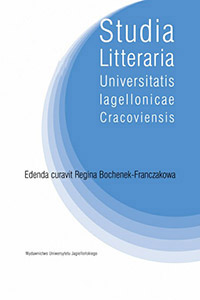Komizm złożony w budowie świata surrealistycznego w Jesieni w Pekinie Borisa Viana
Complex Comism in Creation of Surreal World in Boris Vian’s Autumn in Peking
Author(s): Tomasz WojewodaSubject(s): Metaphysics, Novel, French Literature, Philosophy of Language, Hermeneutics
Published by: Wydawnictwo Uniwersytetu Jagiellońskiego
Keywords: Boris Vian; Autumn in Peking; complex comism; surrealism; bricolage;
Summary/Abstract: The objective of present article is to draw attention on important role of comical element in creating surrealistic world, present in the prose of Boris Vian (1920-1959) – one of the most original French writers in the twentieth century. As a exemplificative material the author used Autumn in Peking, one of the most famous and most representatives Vian’s novels. Employing the classification proposed by Polish aesthetician Bohdan Dziemidok (elementary comism vs. complex comism), the author, placing himself in the hermeneutical spirit, analyses the novel’s narration in order to find various elements of complex comism, revolving around these comical elements, which are the result either of the novel’s composition or of diegesis’ construction. The present analyse is preceded by a short historical-literary reflexion which objective is to present a rich literary production of Boris Vian in the large context of times during which he used to write. Vian was indeed a writer whose literary idiom was influenced by various philosophical movements of those days – surrealism, nihilism, existentialism. A significant element of the article is the hypothesis according to which Boris Vian can be numbered among the artists using in his writing the bricolage technique – the concept proposed in different context by Claude Lévi-Strauss in his work entitled The Savage Mind (1962).
Journal: Studia Litteraria Universitatis Iagellonicae Cracoviensis
- Issue Year: 13/2018
- Issue No: 1
- Page Range: 53-63
- Page Count: 11
- Language: Polish

